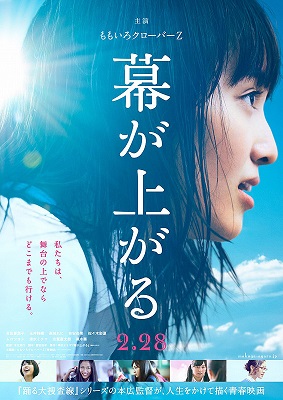
Asian Pop-Up Cinema
Wilmette Theater
Sunday, October 9
2:00PM
For those of you in the Greater Chicagoland area, Asian Pop-Up Cinema is a great program to follow for Asian films in general and Japanese films in particular. Earlier this year I saw “Three Stories of Love,” which was an inspired movie that resulted from a series of acting workshops put on by director Ryosuke Hashiguchi.
Asian Pop-Up Cinema just started their third season, and next week they’ll be showing “When The Curtain Rises” (幕が上がる), which is kind of the opposite of “Three Stories of Love”: rather than the material being produced naturally through workshops, the idol group Momoiro Clover Z was drafted to act in an adaptation of the 2012 novel by Oriza Hirata.
The movie is a sweet if at times melodramatic treatment of a Japanese school movie: the group of girls from Fujigaoka High School go from a write-off drama club to a serious competitor at the prefectural competition. Protagonist Saori Takahashi is voted in as captain at the start of the film and is forced to negotiate her way through the emotions of her actors and lack of inspiration in order to put together a real performing group.
For me, as someone who has worked in Japanese schools, one of the most interesting aspects of the film was the treatment of crying. The movie starts with the school’s final club performances and a loss in the school competition that doesn’t seem to surprise anyone. Nevertheless, Mizoguchi-sensei, the group’s hapless coach, tries to work up the emotion to force himself to cry in his end-of-year message to the girls. The girls themselves don’t shed even a single tear.
Japanese students cry often. Most noticeably at their graduations, which are broadcast on the local news, and the tears are mostly those of joy, of appreciation, and maybe a few of a sadness for the upcoming departure, but they are not negative by any means. Viewers should watch to see if and when tears pop up again in the movie. The girls do find inspiration and sincerity in Yohioka-sensei, a new teacher who used to be a stage actor, who is inspired by the girls in turn.
“When The Curtain Rises” also does a great job of introducing Japanese spaces. Fujigaoka is a somewhat idyllic town at the foot of Mt. Fuji, and we see the town’s library, the school’s teacher’s lounge, the bus the kids ride into Tokyo on their summer trip, in addition to all the spaces in the school itself.
At 119 minutes, the movie feels like it would benefit from a trim, but some of the extra time is filled with clips from Japanese acting troupes, which seem to be real and inspired.
One other noticeable touch by either director Katsuyuki Motohiro, the screenwriter, or Hirata himself is the presence of only two male roles in the film: the women of the film are allowed to shine on their own. Mizoguchi-sensei adds slapstick comedy, and Takita-sensei, the Japanese teacher, adds serious artistic consideration with his solemn intonement of literary texts.
All in all, the movie in a sweet film and worth seeking out if you’re a fan of idol groups and Japanese pop music, interested in Japanese school culture, or interested in theater acting.
